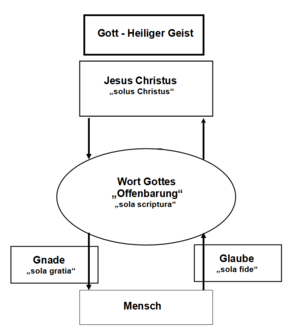Solus Christ
The Latin formula solus Christ is a short term for a theological principle of the Reformation . This principle is that Jesus Christ is the sole mediator of salvation. The following statement in the New Testament is often used for this purpose: “One is God, one is also the mediator between God and man: the man Christ Jesus” ( 1 Tim 2,5 EU ).
Protestant church
The EKD explained “solus Christ” as a key point of Reformation theology: God is clearly to be found in Christ alone, and man should believe in Christ alone.
Catholic Church
The Reformation principle alone, Christ, is important in the debate with the Roman Catholic Church ( veneration of saints and Mary , human participation in God's work of salvation ).
The Second Vatican Council emphasizes on the one hand, referring to Christ: “One is our mediator”. On the other hand, it says about the Virgin Mary:
- “By receiving, giving birth and nourishing Christ, presenting him to the Father in the temple and suffering with her son dying on the cross, she participated in the work of the Savior in a unique way in obedience, faith, hope and ardent love to restore the supernatural life of the Souls. "
In doing this, the council expresses the idea that Mary was a part of salvation.
Free Churches
In his definition of “ free churches ” Franz Graf-Stuhlhofer uses three criteria, starting with Christ alone . He explains the relation of this criterion to the free churches as follows:
- “In the consistent Reformation spirit, salvation is represented solely through faith in Jesus Christ. In this way, the Free Church differentiates itself from both the national church and the sect, because both practiced - at least in the past - the attitude 'outside the church, no salvation'. "
Four Reformation "solos"
In addition to the solus Christ ("Christ alone"), the Reformation churches also contain the Latin principles sola scriptura (German "solely through the Scriptures"), sola fide ("solely through faith") and sola gratia ("solely by grace") .
Individual evidence
- ↑ Justification and Freedom. 500 years of the Reformation 2017. A basic text of the Council of the Evangelical Church in Germany , 2014
- ↑ Peter Blickle : The Reformation in the Empire. 2nd edition, UTB 1181, Eugen Ulmer, Stuttgart 1992, ISBN 3-8001-2626-5 , p. 44
- ^ Second Vatican Council , Dogmatic Constitution on the Church Lumen Gentium , Art. 60 and 61 .
- ↑ Franz Graf-Stuhlhofer: Free Church between Volkskirche and Sect Attempt to define a definition based on three characteristics. In: Free Church Research 17 (2008), pp. 290–296.

